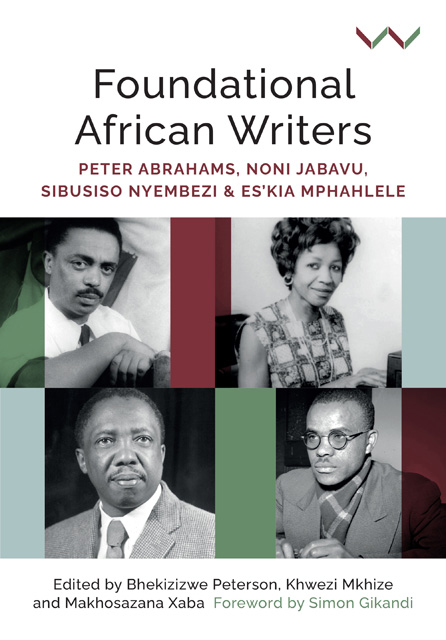Book contents
- Frontmatter
- Contents
- List of illustrations
- Foreword
- Acknowledgements
- Tribute to Professor Bhekizizwe Peterson
- Introduction
- Part I Remapping and Rereading African Literature and Cultural Production
- Part II South Africa and Fugitive Imaginaries
- Part III In the Eye of the Short Century: Diaspora and Pan-Africanism Reconsidered
- Contributors
- Index
19 - From South Africa to Coyaba: Peter Abrahams’ (New) World Geographies
Published online by Cambridge University Press: 01 September 2022
- Frontmatter
- Contents
- List of illustrations
- Foreword
- Acknowledgements
- Tribute to Professor Bhekizizwe Peterson
- Introduction
- Part I Remapping and Rereading African Literature and Cultural Production
- Part II South Africa and Fugitive Imaginaries
- Part III In the Eye of the Short Century: Diaspora and Pan-Africanism Reconsidered
- Contributors
- Index
Summary
… written under different circumstances it would have been a different but not necessarily a better book.
—C.L.R. James, ‘Preface’, The Black JacobinsPeter Abrahams’ novel, A Wreath for Udomo, appeared in 1956, a little less than a year before Ghana gained independence from Britain on 6 March 1957. The novel’s protagonist, Michael Udomo, was read as a composite of Kwame Nkrumah and Jomo Kenyatta. Respectively, Nkrumah and Kenyatta were (or would be) the first leaders of independent Ghana and Kenya. The years 1956 and 1957 were an exuberant time; Ghanaian independence was the beginning of political decolonisation across Africa and the Caribbean. Yet for Abrahams the prospect of the coming decolonisation did not bode well; A Wreath for Udomo was a searing critique of African post-independence leadership. Ten years later Abrahams followed A Wreath for Udomo with another novel about decolonisation, This Island Now. But whereas A Wreath for Udomo was set in London and Panafrica, in This Island Now, published four years after the first islands of the anglophone Caribbean gained independence, Abrahams deployed an anglophone Caribbean island as his novel’s setting. In this essay, I explore Abrahams’ different treatments of decolonisation in Africa and the Caribbean through close readings of A Wreath for Udomo and This Island Now. I argue that he offers two different readings of decolonisation and post-independence governance in each novel as a result of the different places and times in which they are set. I show that when writing of Ghana and Kenya in the 1950s, Abrahams understood ‘tribalism’ − or the desire to return to precolonial structures of belonging − to be the main crisis of decolonisation in Africa. In the Caribbean, I contend that he saw colour and race as central. But if A Wreath for Udomo ends in tragedy with Michael Udomo’s murder, his political equivalent, Albert Josiah, president of the Caribbean anywhere-island on which This Island Now is set, escapes unaware that there was even an attempt on his life. Taken together as two different versions of the decolonisation novel, A Wreath for Udomo and This Island Now operate similarly to C.L.R. James’ 1938 and 1963 versions of The Black Jacobins.
- Type
- Chapter
- Information
- Foundational African WritersPeter Abrahams, Noni Jabavu, Sibusiso Nyembezi and Es'kia Mphahlele, pp. 417 - 432Publisher: Wits University PressPrint publication year: 2022

